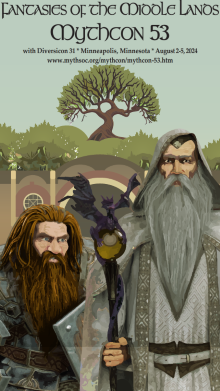Loading...
Event Website
https://www.mythsoc.org/oms/oms-2023.htm
Start Date
8-5-2023 3:00 PM
End Date
8-5-2023 3:50 PM
Description
The Marriage of Heaven and Hell by William Blake the Romantic, proffers a Romantic vision of hell, and a geographical representation of capacity and scope with an energetic apology. On the other hand, C.S. Lewis’s vision of hell in The Great Divorce is that of a land without substance: a land of addiction to mental maladies, an endless mental substance abuse, an emptying of presence. As one surveys the conversations throughout the book, one gets an increasing sense of the importance of understanding place correctly, as a matter of eternal consequence. One chapter concerns a well-travelled ghost who repeats his conviction that genuine progress is impossible because place, as a principle is empty of substance, “one wall inside another.” Another ghost, a bishop no less, does not realize he is in hell, and mocks his friend for “believing in a literal heaven and hell.” Spiritual beliefs can be summarized as “speculative questions,” and a desire for “real” things is a “hankering after matter.” When he states that he would like to come to an “atmosphere of inquiry,” he does not mean that he is willing to travel to a new place with a new, real atmosphere, of a world that is the answer to inquiry. The ghost understands the phrase strictly as a symbol, and thus commits “substance abuse” to the nature of the spatiotemporal world: he understands “spiritual reality” only as a series of metaphors for psychological states.
Creative Commons License

This work is licensed under a Creative Commons Attribution-NonCommercial-No Derivative Works 4.0 International License.
Included in
Children's and Young Adult Literature Commons, Comparative Literature Commons, Digital Humanities Commons, European Languages and Societies Commons, Literature in English, Anglophone outside British Isles and North America Commons, Literature in English, British Isles Commons, Literature in English, North America, Ethnic and Cultural Minority Commons, Medieval Studies Commons, Modern Languages Commons, Modern Literature Commons, Other English Language and Literature Commons
Substance Abuse: C.S. Lewis and the Symbolic Geography of Hell
The Marriage of Heaven and Hell by William Blake the Romantic, proffers a Romantic vision of hell, and a geographical representation of capacity and scope with an energetic apology. On the other hand, C.S. Lewis’s vision of hell in The Great Divorce is that of a land without substance: a land of addiction to mental maladies, an endless mental substance abuse, an emptying of presence. As one surveys the conversations throughout the book, one gets an increasing sense of the importance of understanding place correctly, as a matter of eternal consequence. One chapter concerns a well-travelled ghost who repeats his conviction that genuine progress is impossible because place, as a principle is empty of substance, “one wall inside another.” Another ghost, a bishop no less, does not realize he is in hell, and mocks his friend for “believing in a literal heaven and hell.” Spiritual beliefs can be summarized as “speculative questions,” and a desire for “real” things is a “hankering after matter.” When he states that he would like to come to an “atmosphere of inquiry,” he does not mean that he is willing to travel to a new place with a new, real atmosphere, of a world that is the answer to inquiry. The ghost understands the phrase strictly as a symbol, and thus commits “substance abuse” to the nature of the spatiotemporal world: he understands “spiritual reality” only as a series of metaphors for psychological states.



Comments
SESSION IV
3:00 PM—3:50 Eastern
2:00 PM—2:50 Central
1:00 PM—1:50 Mountain
12:00 Noon—12:50 PM Pacific
7:00 PM—7:50 GMT